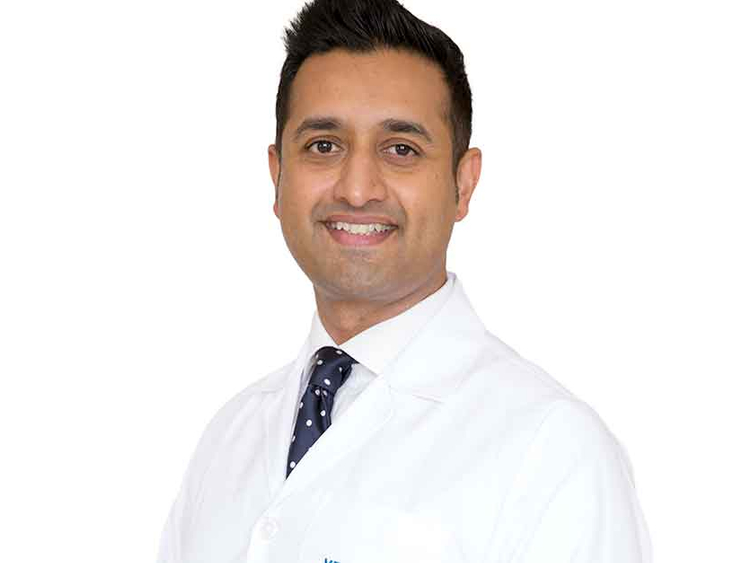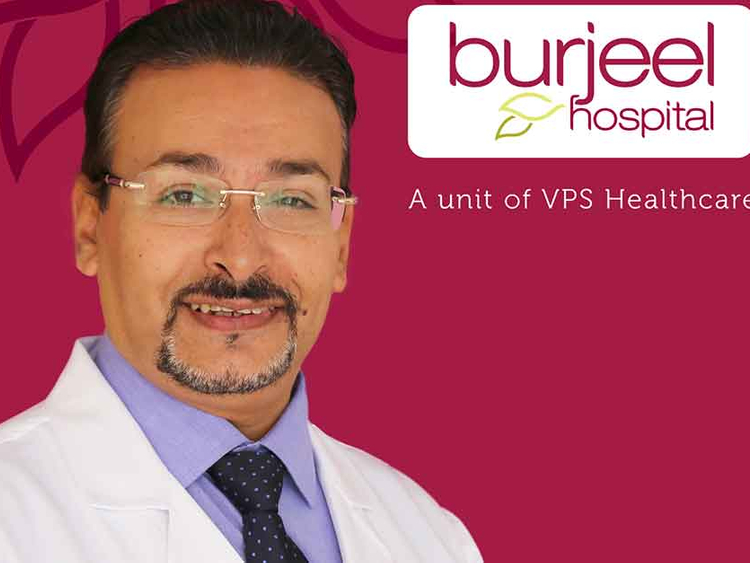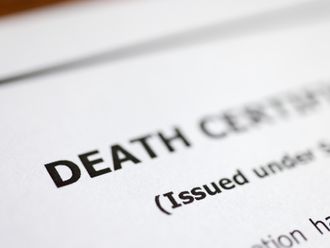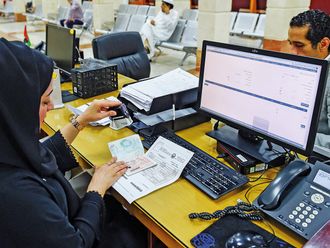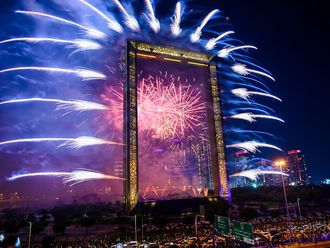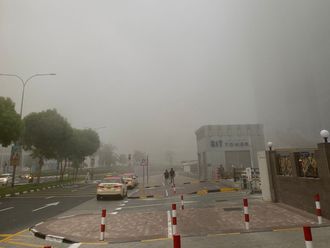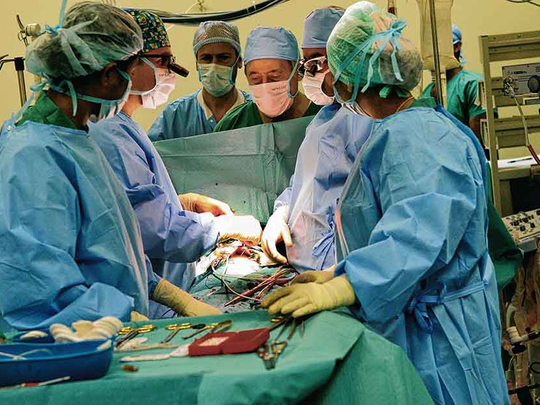
Idris Miah Mohammad, a 54-year-old Bangladeshi living in the capital, received a new lease of life last month after doctors at Burjeel Hospital in Abu Dhabi performed a high-risk heart surgery on him.
Mohammad visited the hospital in a desperate state in August, with a 50 per cent decline in his heart function. With a history of chronic heart disease, he also had severe calcific aortic stenosis, the narrowing of the exit of the left ventricle.
“The patient had a weak heart that was not functioning normally,” explains Dr Walid Shaker, Associate Professor and Consultant — Cardiothoracic Surgeon at Burjeel Hospital Abu Dhabi. “We undertook a surgery to replace his aortic valve with a mechanical one and performed grafts coronary bypass surgery to help the patient’s heart recover slowly.”
The hospital’s most experienced surgeons and support teams performed the operation. “The surgery lasted eight hours, and we used an advanced surgical technique, with minimal blood transfusion,” says Dr Shaker. “The patient was in stable condition after the surgery. He was discharged from the hospital after ten days to start the rehabilitation programme.”
“I now have a second chance at life, where I can talk without being breathless,” says Mohammad. “For me, this is nothing short of a miracle.”
Complicated cardiac surgeries are not new to the UAE. Most large hospitals, both private and public, routinely conduct a range of advanced cardiac surgeries on high-risk patients. The UAE government has also adopted a strategy of encouraging local health-care service providers to continuously upgrade infrastructure, expertise and services. This has helped patients, who earlier travelled abroad for advanced medical treatment to get quality care in the country creating a hub for regional medical tourists seeking affordable European-standard heart treatment.
The biggest killer
Cardiovascular disease (CVD) is the leading cause of death and disability worldwide, killing 17.5 million people a year, expected to rise to more than 23.6 million by 2030, according to the WHO. In 2014, heart disease amounted to 30 per cent of deaths in the UAE, a survey commissioned by the Dubai Health Authority (DHA) in partnership with the Dubai Statistics Centre, revealed earlier this year.
Data released by Zurich Insurance also highlighted that heart disease and cancer are the two leading causes of premature death, critical illness and disability in the UAE and other Gulf countries. The GCC has high risk factors for heart disease owing to rising obesity rates, diabetes and changing lifestyles.
Along with ongoing expansion and improvement in medical infrastructure, the mandatory health insurance coverage for all residents is a new driver for growth in the health-care sector, encouraging patients to avail of complex procedures in the country.
“While historically many expatriate patients preferred to return home for cardiac care, they have now started to realise that, with world-class facilities and staff, hospitals in Dubai are equipped to handle any medical complications,” says Dr Adam N. Mather, Consultant Interventional Cardiologist at Mediclinic City Hospital. “We have noticed a progressive and significant increase in the numbers of cardiac procedures performed at our hospital in the past few years.
“We performed approximately 1,500 invasive cardiac procedures last year. These include invasive coronary angiograms, coronary stenting procedures and coronary artery bypass graft operations,” he adds.
Track record
Doctors in the UAE have performed many life-saving heart surgeries over the past few years — a testament to the country’s expertise in cardiac care.
Cardiologists from Rashid Hospital recently performed three live procedures, which were transmitted to more than 20,000 cardiologists attending the annual meeting of the European Association of Cardiovascular Interventions in Paris. While the first procedure was performed on a 30-year-old Pakistani expatriate with diabetes and hypertension to correct the narrowing of the main artery, the second surgery was conducted on a 60-year-old Indian expatriate who needed opening of two major arteries. The third was performed on a 46-year-old hypertensive patient from Pakistan, who was admitted with chest pain and found to have narrowing in one of the main arteries and its side branch.
The aim of such transmissions is to train and educate physicians from around the world, while showcasing the skills and expertise of health-care professionals in Dubai.
Dubai Healthcare City-based Mediclinic City Hospital’s cardiac catheter laboratory is equipped to deal with the most complex cases of coronary artery disease. Its interventional cardiologists offer expertise in rotational atherectomy, which involves using a diamond-coated drill to remove calcification from heart arteries to enable coronary stenting.
Mediclinic City is also one of the first private hospitals in the UAE to perform Transcatheter Aortic Valve Implantation (Tavi), a minimally invasive procedure performed on patients suffering from aortic valve stenosis. The hospital has performed over a dozen Tavi surgeries in the past ten months.
In 2015, Burjeel Hospital performed 150 cardiac procedures including open-heart surgeries, coronary bypass, valve repair, valve replacement and adult congenital procedures.
DHA recently expanded the cardiac facilities at Dubai Hospital to cater to the growing demand for specialised treatment. The hospital’s cardiology department, known as the Dubai Heart Centre, features a dedicated floor for cardiology services, with the expansion increasing the bed capacity from 42 to 54.
Medical tourism
“Medical tourists usually come here for definitive procedures such as coronary stenting or cardiac surgery,” says Dr Mather. “While we predominantly treat medical tourists from Jordan, Iraq and Syria, we also get patients who come from the Far East and North Africa, as Dubai is also a popular destination for accompanying families to visit and explore.”
Most heart surgeries performed in hospitals in the UAE cost significantly less than in other popular medical tourism destinations in Europe and the US with success rates remaining comparable to established centres of cardiac care. This has made the UAE a sought-after destination for life-saving cardiac treatment for patients from the wider Middle East, South Asia and African countries.
Hospitals in the UAE boast English-speaking doctors and support staff, translators and dedicated patient desks to cater to foreign visitors.


